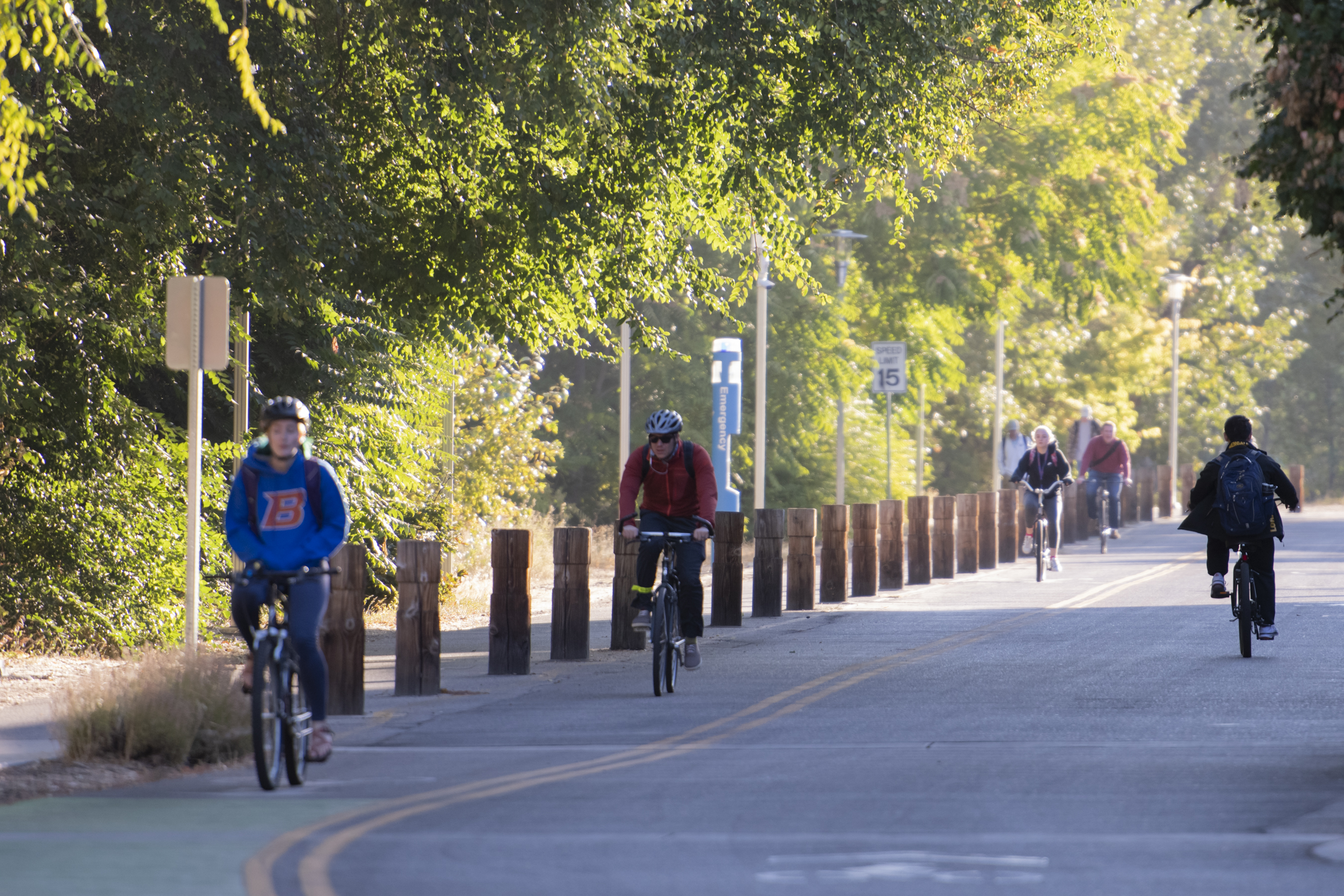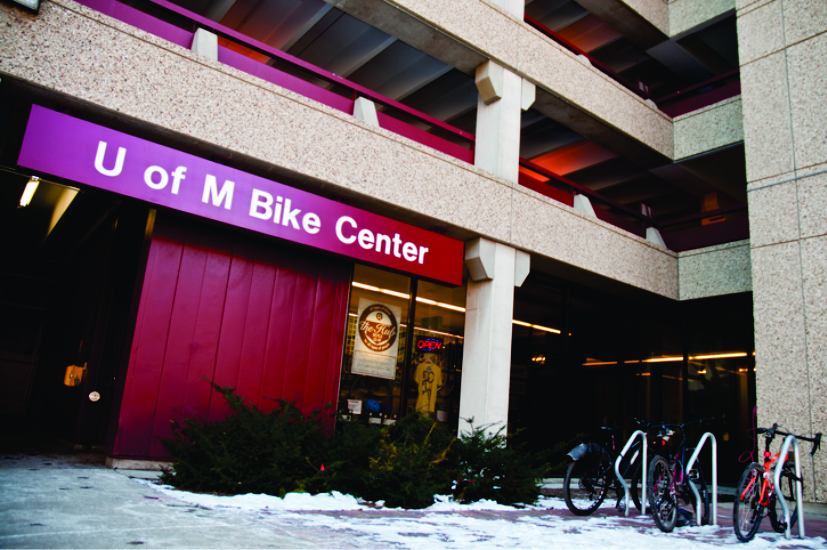DISCOVER YOUR LOCAL BICYCLING COMMUNITY
Find local advocacy groups, bike shops, instructors, clubs, classes and more!
38 Schools earn Bicycle Friendly University Awards
Whether on campus or online, universities and colleges faced unforeseen roadblocks in order to serve the needs of their students and employees over the past year. For the 212 schools in the League of American Bicyclists’s Bicycle Friendly University program, overcoming those roadblocks included keeping people who bike moving. The League’s 2020 round of Bicycle Friendly University awards, announced today, honor 38 institutions as Bicycle Friendly Universities, with 34 institutions renewing prior awards, plus four institutions new to the program.
 “Throughout 2020, it has been so inspiring to see communities, businesses, and now universities applying for recognition by our Bicycle Friendly America program,” said Bill Nesper, executive director of the League of American Bicyclists. “The past year has challenged all of us, and few have felt that more than students and educators at all levels. Amidst the pandemic, we are grateful that these 38 institutions see the benefits of being a Bicycle Friendly University to the well-being and health of their students, staff, and faculty. These colleges and universities are leading by example, building healthy environments where people can safely and easily get around by bike, thereby improving the well-being of their community by enabling access to sustainable transportation options.”
“Throughout 2020, it has been so inspiring to see communities, businesses, and now universities applying for recognition by our Bicycle Friendly America program,” said Bill Nesper, executive director of the League of American Bicyclists. “The past year has challenged all of us, and few have felt that more than students and educators at all levels. Amidst the pandemic, we are grateful that these 38 institutions see the benefits of being a Bicycle Friendly University to the well-being and health of their students, staff, and faculty. These colleges and universities are leading by example, building healthy environments where people can safely and easily get around by bike, thereby improving the well-being of their community by enabling access to sustainable transportation options.”
Applications to the Bicycle Friendly University program are graded on how well the campus makes biking an accessible and easy option for everyone. Campuses that earn the highest award levels offer well-connected bike networks with infrastructure for people of all ages and abilities, bike maintenance facilities and secure storage options, theft prevention programs, classes for people to hone their biking skills, campus events that promote bicycling as an option, and staffing to support better biking.
 A renewing Platinum-level BFU, the University of Minnesota – Twin Cities has been a model and mentor for other universities and colleges to follow on the path to platinum. An area in which UMN has excelled is staffing, with its bicycling program having a paid program manager since 1996. Now retired, UMN’s longtime bike coordinator Steve Sanders oversaw changes on campus to include more bike parking, bike facilities, and establishing a University Bike Center. For aspiring platinum BFUs, campuses like UMN demonstrate how to lead on health, sustainability, and consistent improvement.
A renewing Platinum-level BFU, the University of Minnesota – Twin Cities has been a model and mentor for other universities and colleges to follow on the path to platinum. An area in which UMN has excelled is staffing, with its bicycling program having a paid program manager since 1996. Now retired, UMN’s longtime bike coordinator Steve Sanders oversaw changes on campus to include more bike parking, bike facilities, and establishing a University Bike Center. For aspiring platinum BFUs, campuses like UMN demonstrate how to lead on health, sustainability, and consistent improvement.
Institutions earning Gold-level awards show how progress is achieved. Renewing Gold-level Boise State University earned high marks for its leadership and range of bike-related activities such as a weekly class offering how-tos on bike commuting, a 1-credit course on bike maintenance, as well as bike parking and other amenities. Many of these initiatives are hosted by its on-campus Platinum-level Bicycle Friendly Business, the Cycle Learning Center. Gold-level Georgia Institute of Technology also scored high for its commitment to improve streets around Atlanta in order to enable better bike access to its campus. Boise State and Georgia Tech are among the eight renewing Gold-level BFUs this round.
“The leadership from Platinum-level schools like UMN and Gold-level schools like Boise State and Georgia Tech on building Bicycle Friendly Universities has such a huge impact on students across the country,” said the League’s Bicycle Friendly America Director, Amelia Neptune. “Through the BFU program, these institutions of higher education are shaping how their peers approach building campuses where people choose to bike. This round shows that no matter the size of their student body, colleges and universities are recognizing bicycling is part of the solution to improving the campus life of their communities. I can’t wait to see how these schools work in 2021 and beyond to build a Bicycle Friendly America for everyone.”
Seven of the BFU awards this round went to institutions upgrading to the Gold-level honor: Michigan State University, Pennsylvania State University, the University of Florida, Utah State University, Virginia Commonwealth University, Washington University in St. Louis, and Lees-McRae College — Lees-McRae also earns the title of smallest college this round, with just over 800 students. Of the 10 Silver-level awards, three BFUs moved up from bronze awards, six renewed, and one, Vassar College, earned a Silver-level award on its first application.
Twelve Bronze-level BFU awards and four Honorable Mentions rounded out the 2020 cohort.
As with each of the Bicycle Friendly America certifications, the BFU application process is a learning experience, one of both self-reflection and guidance on how to build a campus community that is more welcoming to people who bike. The League’s Bicycle Friendly University application sets achievement standards for colleges and universities to reach at the honorable mention, bronze, silver, gold, and platinum levels. Every four years, institutions must reapply to the program, and many strive to upgrade their award by investing resources into making their campuses more welcoming to people who bike.
See the list of new and renewing BFU awards in 2020, as well the complete list of all 212 current Bicycle Friendly Universities. The Bicycle Friendly University program includes colleges and universities in 47 states and the District of Columbia, and is part of the League’s Bicycle Friendly America program, which also awards communities and businesses with certifications as part of its mission to create a Bicycle Friendly America for everyone.
The League of American Bicyclists was founded in the 1880s by Americans who saw bicycling as critical to our nation’s future. These early advocates organized and petitioned Congress to pave the first roads in America to increase the accessibility and safety of bicycling. Today, 140 years later, the League continues to promote building a more Bicycle Friendly America for Everyone through advocacy, education, and the promotion of bicycling and its many benefits. We see bicycling as a simple solution for so many of the crises our country is facing, from racial justice to economic recovery to public health to climate change.